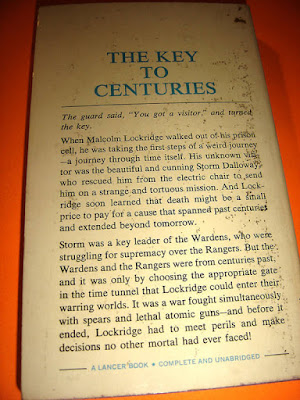(There is at least one major error in this blurb for The Corridors Of Time by Poul Anderson.)
The Time Machine by HG Wells is, in JB Priestley's phrase, a "little masterpiece" because it was repeatedly rewritten and went through many changes. Published have been "The Chronic Argonauts," two versions of The Time Machine and passages cut from the text. I have read that other passages exist in manuscript and that two versions are known of only through the reminiscence of a friend in whom Wells confided. In one such intermediate version, Wells dispensed with the Time Traveler and merely described a future society. This highlights two ways to present a fictional future. A character can either visit the future or be born in it.
In Poul Anderson's works, Dominic Flandry is born in the Terran Empire whereas Malcolm Lockridge merely visits the period of the Wardens and Rangers. Consequently, Lockridge is culture shocked whereas Flandry is not. This point impacts on several other speculative works by Anderson. A twentieth century man who feels useless if he is not able to earn his living would probably be unhappy if he were transported into a utopian society where wealth is abundant so that "work" in our sense of that word has become redundant whereas someone who had been born into such a society would have been brought up to engage in many meaningful and fulfilling activities. Wealth entails opportunities to play, learn, travel, interact etc.
Tempora mutantur nos et mutamur in illis. (Times change and we change with them.)

8 comments:
Kaor, Paul!
Times may change and people may change with them, BUT, not always for the better. Even if drastic advances in technology lead to a society where no one HAS to work, I have strong doubts many, never mind MOST, will take advantage of the opportunities "...to play, learn, travel, interact, etc." Ennui, despair, a sense of uselessness, powerlessness, etc., are at least as likely. I don't think most people will have that kind of philosophic temperament.
And Poul Anderson shared my skepticism, as we see as early as his "Quixote And The Windmill."
Sean
Sean,
"Quixote..." was set in a transitional period.
Paul.
Kaor, Paul!
But it was emblematic of Poul Anderson's skepticism that the kind of society you favor most will ever actually work. See, as well, the HARVEST OF STARS books and GENESIS. The rise of societies with no want in them still did not prevent ennui, despair, a sense of futility, etc.
Sean
Sean,
I agree that those other works show PA agreeing with you. Your views are more appropriate to this blog than mine!
Paul.
Kaor, Paul!
Oops! Because it comes down to both PA and I agreeing human beings are IMPERFECT and, most likely, will always be like that. I argue, and again I think Anderson would agree, that any tolerable human society has to realistically conform to what actual human beings are like, not what we would like them to be.
Sean
Kaor, Paul!
I took a closer look at the blurb pictured for Anderson's novel THE CORRIDORS OF TIME and saw two errors, not one.
First, Malcolm Lockridge had not been condemned to death by electrocution. Second the societies of the Wardens and Rangers arose CENTURIES ahead, in the future.
Sean
Sean,
Right. I spotted you 2nd point but wasn't sure about the electrocution which is why I wrote "at least."
Paul.
Kaor, Paul!
If Malcolm Lockridge HAD been condemned to death it would have been much harder even for Storm Dalloway to spring him from prison!
Sean
Post a Comment